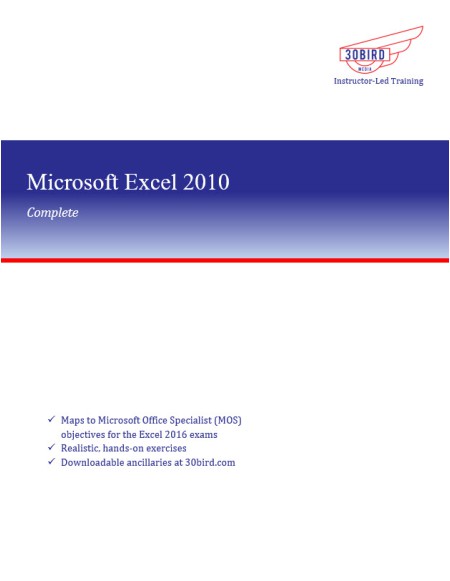Chapter 1: Fundamentals
Module A: Getting around
Module B: Workbook basics
Chapter 2: Creating worksheets
Module A: Entering data
Module B: Formulas
Module C: Functions
Module D: Moving and copying data
Module E: Reference types
Chapter 3: Formatting
Module A: Text formatting
Module B: Number formatting
Module C: Alignment
Module D: Borders and highlighting
Module E: Styles and themes
Chapter 4: Manipulating data
Module A: Data entry shortcuts
Module B: Paste options
Module C: Inserting, deleting, and hiding
Chapter 5: Charts
Module A: Creating charts
Module B: Chart types and elements
Chapter 6: Output
Module A: Managing worksheet windows
Module B: Printing worksheets
Module C: Sharing workbooks
Chapter 7: Settings and templates
Module A: Workbook options and properties
Module B: Templates
Chapter 8: Managing workbooks
Module A: Managing worksheets
Module B: Customizing Excel
Chapter 9: Named ranges
Module A: Using names in formulas
Chapter 10: Tables
Module A: Sorting
Module B: Filtering tables
Module C: Validation
Module D: Transposing data
Chapter 11: Summarizing data
Module A: Consolidation
Module B: Subtotals
Chapter 12: PivotTables
Module A: Creating and formatting PivotTables
Module B: Manipulating PivotTables
Module C: PivotCharts
Chapter 13: Presentation features
Module A: Conditional formats
Module B: Graphics
Chapter 14: Advanced charts
Module A: Special chart types
Module B: Sparklines
Chapter 15: Collaboration
Module A: Permissions
Module B: Shared workbooks
Module C: Web features
Chapter 16: Logical and Lookup Functions
Module A: Decision-making functions
Module B: Lookup and reference functions
Chapter 17: Advanced Formulas
Module A: Auditing and error-trapping
Module B: Formula options
Module C: Arrays
Chapter 18: Special functions
Module A: Date and time functions
Module B: Text functions
Module C: Other functions
Chapter 19: Importing and Exporting
Module A: External data
Module B: Exporting data
Chapter 20: Analysis
Module A: What-if analysis
Module B: The Analysis Toolpak
Chapter 21: Macros and Forms
Module A: Recording macros
Module B: Running macros
Module C: Forms
Our Excel 2010 Complete courseware provides the concepts and skills to be productive with Microsoft Excel 2010, starting with fundamentals and working up to advanced tools and techniques. This course maps to the objectives of the Microsoft Office Specialist and Expert exams for Excel 2010. Objective coverage is marked throughout the course, and you can download an objective map.
Students will benefit most from this course if they want to use Excel 2010 to perform real-world tasks, from common workplace tasks to complex operations with large amounts of data. If students intend to take a Microsoft Office Specialist or Expert exam for Excel, this course offers complete coverage of all the objectives for both exams.
The courseware assumes students know how to use a computer, and that they're familiar with Microsoft Windows. It does not assume that they've used a different version of Excel or another spreadsheet program before.
To request the PowerPoints for this course, please e-mail sales@30bird.com.

